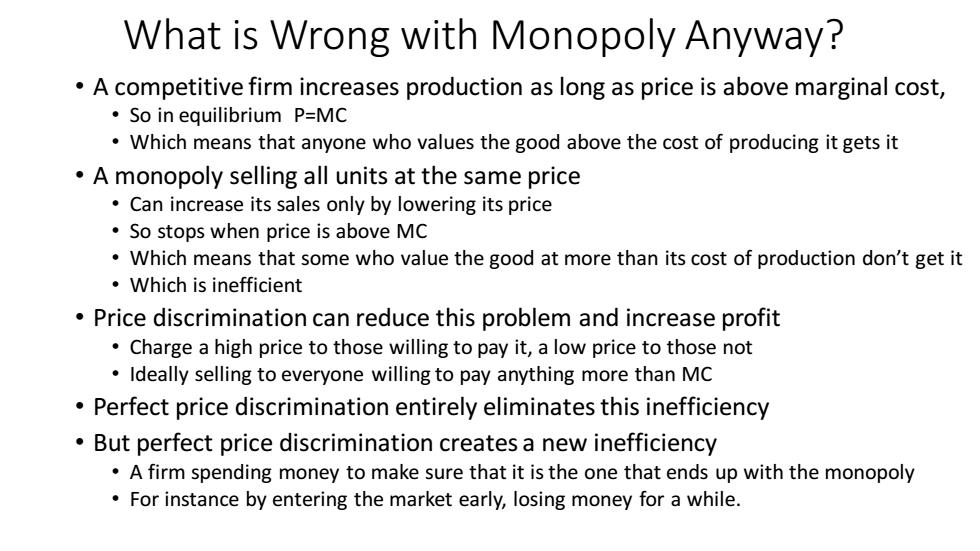
What is Wrong with Monopoly Anyway? A competitive firm increases production as long as price is above marginal cost, So in equilibrium P=MC Which means that anyone who values the good above the cost of producing it gets it A monopoly selling all units at the same price Can increase its sales only by lowering its price So stops when price is above MC Which means that some who value the good at more than its cost of production don't get it ·Which is inefficient Price discrimination can reduce this problem and increase profit Charge a high price to those willing to pay it,a low price to those not Ideally selling to everyone willing to pay anything more than MC Perfect price discrimination entirely eliminates this inefficiency But perfect price discrimination creates a new inefficiency A firm spending money to make sure that it is the one that ends up with the monopoly For instance by entering the market early,losing money for a while
What is Wrong with Monopoly Anyway? • A competitive firm increases production as long as price is above marginal cost, • So in equilibrium P=MC • Which means that anyone who values the good above the cost of producing it gets it • A monopoly selling all units at the same price • Can increase its sales only by lowering its price • So stops when price is above MC • Which means that some who value the good at more than its cost of production don’t get it • Which is inefficient • Price discrimination can reduce this problem and increase profit • Charge a high price to those willing to pay it, a low price to those not • Ideally selling to everyone willing to pay anything more than MC • Perfect price discrimination entirely eliminates this inefficiency • But perfect price discrimination creates a new inefficiency • A firm spending money to make sure that it is the one that ends up with the monopoly • For instance by entering the market early, losing money for a while
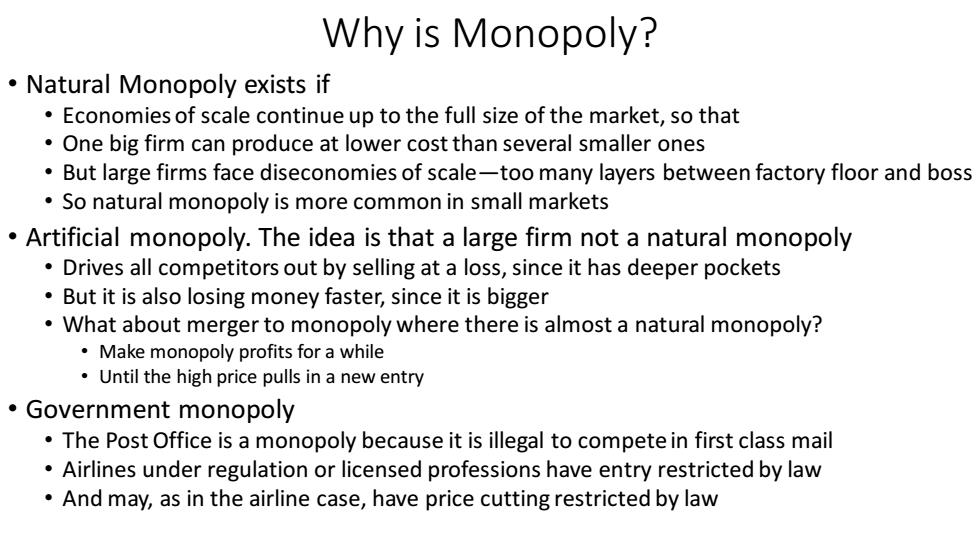
Why is Monopoly? Natural Monopoly exists if Economies of scale continue up to the full size of the market,so that One big firm can produce at lower cost than several smaller ones But large firms face diseconomies of scale-too many layers between factory floor and boss So natural monopoly is more common in small markets Artificial monopoly.The idea is that a large firm not a natural monopoly Drives all competitors out by selling at a loss,since it has deeper pockets But it is also losing money faster,since it is bigger What about merger to monopoly where there is almost a natural monopoly? Make monopoly profits for a while Until the high price pulls in a new entry ·Government monopoly The Post Office is a monopoly because it is illegal to compete in first class mail Airlines under regulation or licensed professions have entry restricted by law And may,as in the airline case,have price cutting restricted by law
Why is Monopoly? • Natural Monopoly exists if • Economies of scale continue up to the full size of the market, so that • One big firm can produce at lower cost than several smaller ones • But large firms face diseconomies of scale—too many layers between factory floor and boss • So natural monopoly is more common in small markets • Artificial monopoly. The idea is that a large firm not a natural monopoly • Drives all competitors out by selling at a loss, since it has deeper pockets • But it is also losing money faster, since it is bigger • What about merger to monopoly where there is almost a natural monopoly? • Make monopoly profits for a while • Until the high price pulls in a new entry • Government monopoly • The Post Office is a monopoly because it is illegal to compete in first class mail • Airlines under regulation or licensed professions have entry restricted by law • And may, as in the airline case, have price cutting restricted by law
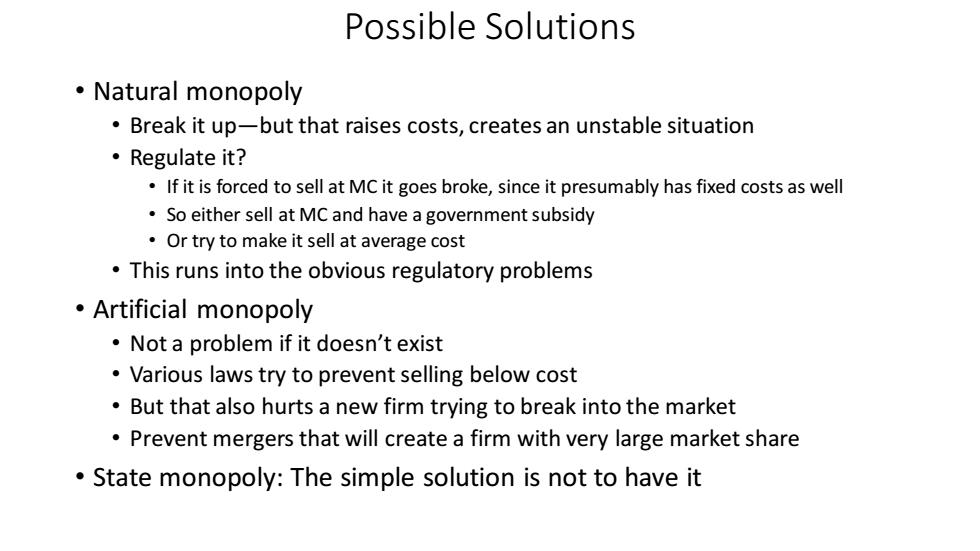
Possible Solutions ·Natural monopoly Break it up-but that raises costs,creates an unstable situation ·Regulate it? If it is forced to sell at MC it goes broke,since it presumably has fixed costs as well So either sell at MC and have a government subsidy Or try to make it sell at average cost This runs into the obvious regulatory problems ·Artificial monopoly Not a problem if it doesn't exist Various laws try to prevent selling below cost But that also hurts a new firm trying to break into the market Prevent mergers that will create a firm with very large market share State monopoly:The simple solution is not to have it
Possible Solutions • Natural monopoly • Break it up—but that raises costs, creates an unstable situation • Regulate it? • If it is forced to sell at MC it goes broke, since it presumably has fixed costs as well • So either sell at MC and have a government subsidy • Or try to make it sell at average cost • This runs into the obvious regulatory problems • Artificial monopoly • Not a problem if it doesn’t exist • Various laws try to prevent selling below cost • But that also hurts a new firm trying to break into the market • Prevent mergers that will create a firm with very large market share • State monopoly: The simple solution is not to have it
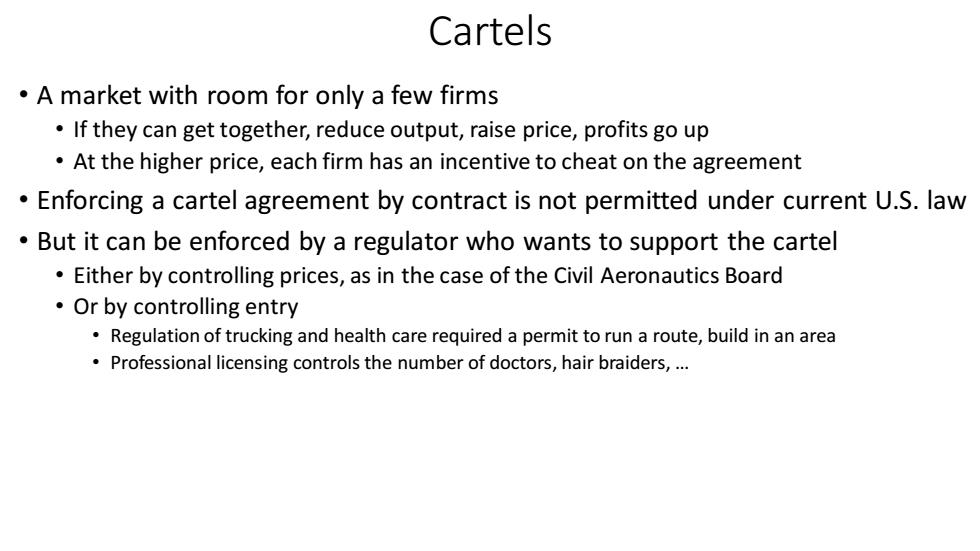
Cartels A market with room for only a few firms If they can get together,reduce output,raise price,profits go up At the higher price,each firm has an incentive to cheat on the agreement Enforcing a cartel agreement by contract is not permitted under current U.S.law But it can be enforced by a regulator who wants to support the cartel Either by controlling prices,as in the case of the Civil Aeronautics Board Or by controlling entry Regulation of trucking and health care required a permit to run a route,build in an area Professional licensing controls the number of doctors,hair braiders
Cartels • A market with room for only a few firms • If they can get together, reduce output, raise price, profits go up • At the higher price, each firm has an incentive to cheat on the agreement • Enforcing a cartel agreement by contract is not permitted under current U.S. law • But it can be enforced by a regulator who wants to support the cartel • Either by controlling prices, as in the case of the Civil Aeronautics Board • Or by controlling entry • Regulation of trucking and health care required a permit to run a route, build in an area • Professional licensing controls the number of doctors, hair braiders, …
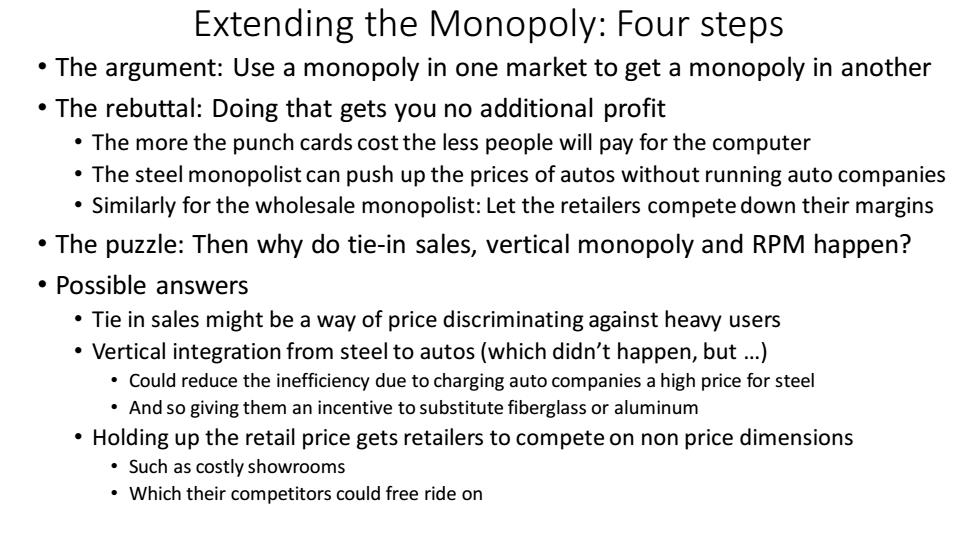
Extending the Monopoly:Four steps The argument:Use a monopoly in one market to get a monopoly in another The rebuttal:Doing that gets you no additional profit The more the punch cards cost the less people will pay for the computer The steel monopolist can push up the prices of autos without running auto companies Similarly for the wholesale monopolist:Let the retailers compete down their margins The puzzle:Then why do tie-in sales,vertical monopoly and RPM happen? ·Possible answers Tie in sales might be a way of price discriminating against heavy users Vertical integration from steel to autos (which didn't happen,but...) Could reduce the inefficiency due to charging auto companies a high price for steel And so giving them an incentive to substitute fiberglass or aluminum Holding up the retail price gets retailers to compete on non price dimensions Such as costly showrooms Which their competitors could free ride on
Extending the Monopoly: Four steps • The argument: Use a monopoly in one market to get a monopoly in another • The rebuttal: Doing that gets you no additional profit • The more the punch cards cost the less people will pay for the computer • The steel monopolist can push up the prices of autos without running auto companies • Similarly for the wholesale monopolist: Let the retailers compete down their margins • The puzzle: Then why do tie-in sales, vertical monopoly and RPM happen? • Possible answers • Tie in sales might be a way of price discriminating against heavy users • Vertical integration from steel to autos (which didn’t happen, but …) • Could reduce the inefficiency due to charging auto companies a high price for steel • And so giving them an incentive to substitute fiberglass or aluminum • Holding up the retail price gets retailers to compete on non price dimensions • Such as costly showrooms • Which their competitors could free ride on